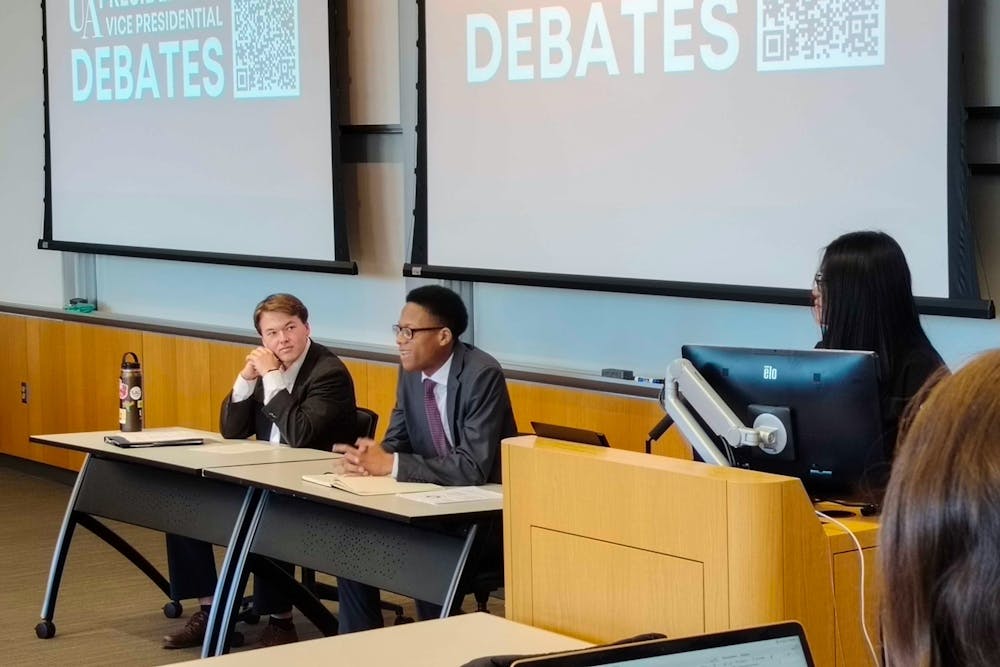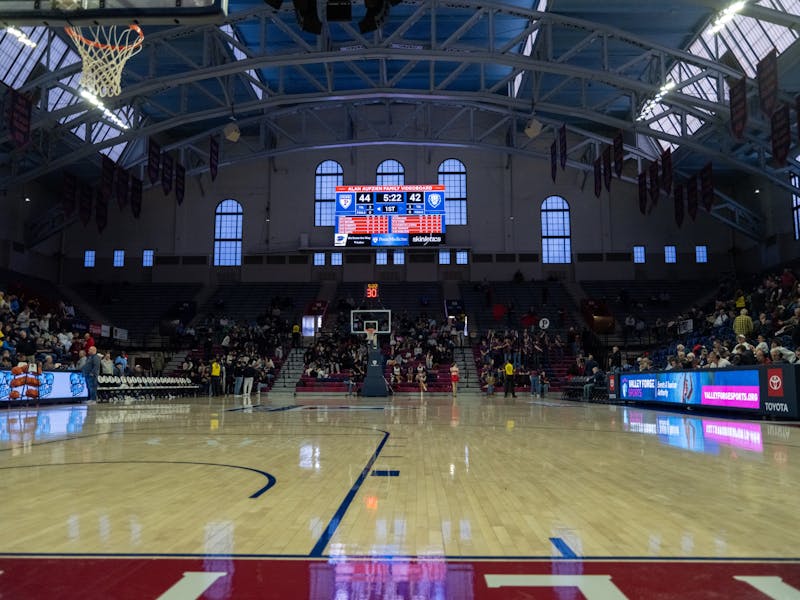
College junior Charlie Schumer (left) and Wharton junior Xavier Shankle (right), the candidates for next year's Undergraduate Assembly President, speak at the debate held on April 2 in Huntsman Hall.
Credit: Harsha RavindranThe Undergraduate Assembly held its Presidential and Vice Presidential debates on March 30 and April 2 in Huntsman Hall.
During the first debate, the presidential candidates, College junior Charlie Schumer and Wharton junior Xavier Shankle, discussed connecting students to resources and administration. During the second debate, the three vice presidential candidates —College sophomore Maya El-Sharif, who is running with Schumer; College junior Ranim Albarkawi, who is running with Shankle; and College sophomore Hannah Liu — joined the presidential candidates to discuss transparency and increasing student engagement.
The debates also touched upon the two candidates' views of recent campus news such as Penn’s decision to discontinue the Dean’s List, recent concerns regarding Greek life hazing, and how the candidates aim to increase diversity, equity, and inclusion.
In their opening statements on Thursday evening, both presidential candidates discussed their goals and experience.
As a second-year UA College Representative and chair of the Student Activities Council, Schumer said his experience gave him “a unique lens in seeing how student life really works here and what people care about.”
He echoed these sentiments on the second day of debates held on Sunday by stating that “the Undergraduate Assembly needs to regain its student-first focus,” and by advocating for greater focus attention from the UA on the issues that are directly impacting students.
As current UA speaker, Shankle said his platform focused on amplifying student voices to administration.
“I want you to know that I know what it’s like to be counted out by an institution,” Shankle said.
Both candidates expressed the importance of supporting student needs and concerns before turning to Penn's role in the community.
Schumer said he wants the UA to act more as an advocacy branch on behalf of student groups, taking an active role in supporting these groups.
“I want to be working on bridging the gap between what the administration has to offer and what students are asking for,” Schumer said.
In addition to addressing student concerns, Shankle added that he would also address big-picture issues such as Penn’s commitment to engagement with West Philadelphia, divestment and fossil fuels, and diversity, equity, and inclusion on campus.
When asked during the second day of debates how each candidate aims to accurately represent the student body’s views as often the sole undergraduate representative in meetings with administrators, the candidates disagreed on how to address this aspect of their role.
Shankle responded that he aims to keep “open streams of communication with the student body and [will] never close off [his] input.” He also shared that he aims to increase engagement with representatives and students outside of GBMs.
Schumer instead disagreed, saying that as the UA President, he does not always have to be the one in the room and instead he aims to delegate the responsibility of representing the student body in administrator meetings to “the voices that are more appropriate to be in the room.”
Regarding budget allocations and how to create more awareness of funding opportunities by the UA, Shankle said that he plans on expanding the budget committee, so that they have a greater capacity to ensure student groups are aware of opportunities and the ability to have their questions answered.
Schumer, on the other hand, disagreed with expanding the budget committee, stating that “the reason most people do not know about what the UA does or about budget allocations is because it doesn’t directly affect them.” He instead aims to refocus initiatives to meet current student needs and what they care about.
During the Vice President debate, candidates discussed how the UA should build a stronger sense of community and engage with students that are not currently aware of their initiatives.
“A large focus of my platform has been transparency between the UA and the student body,” current College representative El-Sharif said.
El-Sharif went on to share how she believes that the UA is missing a direct contact point between them and different student groups and everyday students.
Albarkawi — the current Academic Initiatives Committee director — said that she believes the role of the UA is to connect students, administrators, and student groups, adding that she wishes to make it a “focal point to continue to go out into student groups and engage with students through listening sessions, hosting regular office hours, and making sure that students are being heard throughout the year.”
She also emphasized the importance of consistency in these outreach efforts to ensure that these sessions are not a “simple one-time event” and instead open the dialogue for long-term conversations.
Liu, currently the UA secretary, said that she believes the UA is on the right track with its events, such as its recent tabling events that aimed to increase awareness about the UA and its initiatives. She echoed the sentiments that further consistency was needed and shared her plans to engage with the student body further.
“Frequent meetings are definitely the most important thing, and I’ll be more than happy to clear my schedule just for that purpose,” Liu said.
Voting for both the UA President and Vice President roles began at 9 p.m. on March 30 and will end on April 4 at 11:59 p.m. Students are able to vote on the Penn Student Government website between those times.
The Daily Pennsylvanian is an independent, student-run newspaper. Please consider making a donation to support the coverage that shapes the University. Your generosity ensures a future of strong journalism at Penn.
Donate







